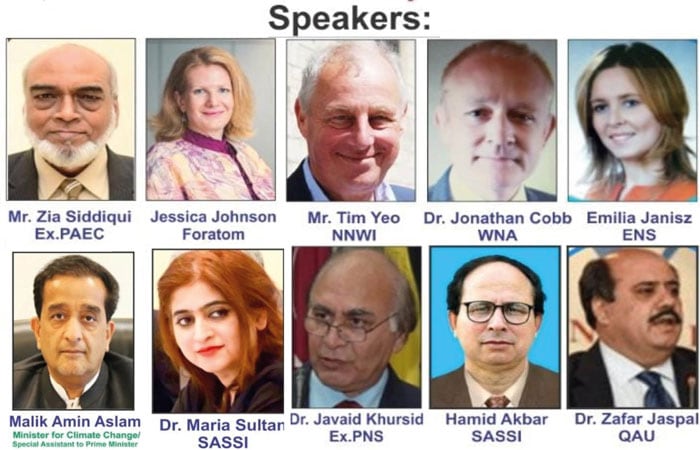International webinar on Nuclear energy
Special Assistant to the Prime Minister on Climate Change Malik Amin Aslam has said that Pakistan intends to adapt to Zero-Carbon emission goal by 2050 in energy by using all types of renewable and low-carbon sources.
He was speaking at an International Webinar on “Nuclear energy: a key to Net Zero (Green Future)” organised by Strategic Stability Institute (SASSI) University on 24 February 2022.
Mr Malik said that we will make optimal use of our wind, hydel, solar and nuclear resources to meet the goals set by Conference of the Parties (COP26) recently held in Glasgow. He said that Pakistan plans to use 40,000 MW nuclear energy by 2050.
Dr Zafar Nawaz Jaspal from School of Politics and International Relations, Quaid-i-Azam University, was the moderator.
Mr. Zia ul Hasan Siddiqui, ex-Member (Power), Pakistan Atomic Energy Commission (PAEC) hoped a global policy regarding increasing the capacity of existing and new reactors. He advised to use only nuclear technology instead of fossil fuel plants for base load power generation. He said that renewable sources are inexhaustible and free but have time, season and geographic limitations.
Emilia Janisz, External Manager of the European Nuclear Societysaid that nuclear energy is available, scalable and deployable. She observed that net zero demands 40% increase in nuclear energy output by 2030 and its double by 2050.
Dr Jonathan Cobb from World Nuclear Association (WNA)said that nuclear technology has a clear future. He said that new reactors are more efficient and have more capacity than earlier lot. COP-26 provided space for global action. He opined that target of 1.5 degree centigrade is weak but we have to keep it. He said that growth is required in nuclear energy to supply 25% of electricity by 2050 under demand of 2-degree scenario.
Dr. Syed Javaid Khurshid, former President, Pakistan Nuclear Society, said that carbondioxide emissions should be stabilised at 550 ppm by 2050. He said that vision of nuclear energy for 2030 and 2050 in Pakistan, is 8,800 MW and 40,000 MW respectively. He proposed the global community to form international nuclear power fund to support the installation of new power plants. He asked developing countries to achieve zero targets quickly.
Mr. Tim Yeo,Chairman of New Nuclear Watch Institute (NNWI) stressed reducing greenhouse gases in this decade. Covid 19 already affected our efforts; he said adding that nuclear energy being a low-carbon base load power was needed more than ever before. He said that threat of climate change is the biggest challenge being a threat to humanity. He said that use of coal must stop adding that gas is also not a solution. He said that Ukraine events highlighted the importance of energy security.
Jessica Johnson, Director Communications & EU Stakeholders FORATOM demonstrated the important contribution of nuclear and renewables to the transition towards a decarbonized European Power system, Foratom, being the voice of nuclear industry in Europe. She said that with nuclear accounting for 24.8% of the energy mix, the EU may go for meeting its 2050 decarbonized targets. She further added that CO2 emissions savings for reaching the increased targets form 40% to 55% for the power sector by the life-time extension of EU existing nuclear fleet by 2030. A climate – neutral Europe envisaged.
Hamid Akbar. Director Nuclear Security Programme, SASSI University, summarised the webinar. He said that it is easy to take our planet for granted until we see the human cost of its degradation. He further added that we are humans who want the same thing every other human wants — a safe place to live on this earth. He said that Pakistan shares of nuclear energy is 7% of the total installed energy.
Hamid Akbar. Director Nuclear Security Programme, SASSI University, summarised the webinar. He said that it is easy to take our planet for granted until we see the human cost of its degradation. He further added that we are humans who want the same thing every other human wants — a safe place to live on this earth. He said that Pakistan shares of nuclear energy is 7% of the total installed energy.
Answering a question, Ms Jessica said that within Europe we produced volumes of waste but wherever possible, we use it in industry. For residual waste, she said projects are underway to provide long storage as a high level spent fuel repository will be ready by 2025 in UK while Sweden and France are also going ahead.









